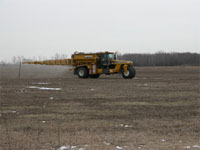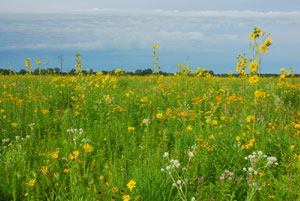Botanical gardens around the world have signed onto a collaborative 20-year project to rescue 100 degraded or destroyed ecosystems from Peru to Kenya.
Responding to a United Nations target to restore at least 15% of the world’s damaged ecosystems by 2020, the Ecological Restoration Alliance includes botanic gardens from the US, UK, Kenya, Australia, Brazil, Mexico and Canada. Other botanic gardens in China, South Africa, and Venezuela are committed to joining or supporting the effort.
Restoration projects will be conducted on six continents, including tropical forests, prairies, wild places within cities, wetlands and coastal sites – ecosystems that are under threat and are no longer able to provide essential services and resources for sustaining human livelihoods and biodiversity.
Projects underway include:
- Beach restoration in Hawaii for green sea turtle nesting
- Re-growing Rio
- Restoring Kenya’s Upland Forest
- Hyperarid Woodlands in Southern Peru
- Healing a Surface Mine Site in Western Australia
- Integrating restoration into Protected Areas management in Madagascar
- Restoring native prairies in the US Midwest


They hope to build global capacity for pragmatic yet well-informed ecological restoration for many more projects. A new generation of practitioners will be trained and guidance provided to industry and governments toward best practices for land restoration.
"We have set ourselves an ambitious goal, but the aim is to heal the wounds that humans have inflicted on the planet on a global scale," says Dr Bruce Pavlik, head of restoration ecology at the UK’s Royal Botanic Gardens.
Right now, he says, most restoration projects are very small. They need to grow to much larger scale.
Unfortunately, many tree planting efforts miss the point. They plant monocultures of non-indigenous trees, which do not support complexity of wildlife.
"Tree planting schemes in many parts of the world fail to protect or restore natural plant diversity. Our new Alliance will address this missed opportunity ensuring that diverse plant-rich habitats are recreated incorporating endangered species that would otherwise be lost," says Sara Oldfield, Secretary General, Botanic Gardens Conservation International.
Scientists will make use of seed banks, such as the Royal Botanic Garden’s Millennium Seed Bank, which has seeds from over 10% of the world’s wild plant species.
Intact Ecosystems Critical
A study released this week shows that intact ecosystems have the best chance of being resilient to the impacts of climate change. The Nature Conservancy study identifies "strongholds" in the US and southern Canada that can help ensure nature’s survival.
These strongholds are complex ecosystems, large enough for species to move within and to, as they try to find safe harbor.
As droughts, rising temperatures and other climate impacts threaten to destabilize natural areas across the US and around the world, scientists believe these resilient landscapes will be strong enough to continue providing habitat to a wide variety of plants and animals while also serving as sources of clean drinking water, fertile soils and other important services people rely upon for survival.
Identifying these areas help people prioritize conservation efforts. These natural strongholds must be protected from damaging development, pollution and other negative actions, or they could lose their ability to shield nature from climate impacts.
"This news gives us hope that – with a little help – nature can endure climate change," says Mark Anderson, Eastern Division Science Director for The Nature Conservancy. "If we work to keep these special landscapes strong, they will help keep nature strong."
He adds: "These strongholds will be critical to all life as the threats of climate change continue to grow. They could serve as breeding grounds and seed banks for many animal and plant species that otherwise may be unable to find habitat due to climate change. They could also serve as essential resources for food and water as society deals with the threats of climate change."
More information on the Nature Conservancy study:
